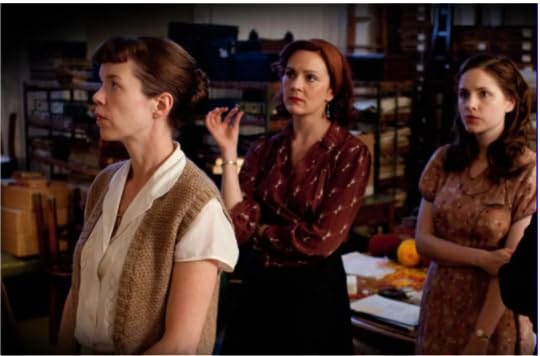There’s not many times that I’m reading something and I realize that as the novel progresses, its trio of protagonists slowly but surely changes for the worse. I love that for them because these are hard-working and lovely women who are flagellated by the war and spit out by its cruel machinations and the fact that they still have some visage of morality and ethics is something to be applauded.
Historical fiction is a tricky subject to write because its penned name is an extreme contradiction. What do you fabricate? What do you honor as the truth? And even if your research is spot on and you have references on references, a first-person account can still blow you out of the water.
It’s a lie and a truth and the honest delivery of a world that could be real yet promises, for legal reasons, that it is absolutely a work of fiction.
It’s a lie, beautifully wrapped.
We follow Osla, Mabs, and Beth as they become code-breakers at Bletchley Park for the anti-Nazi war effort in the UK. It slices the existence neatly into existing heroes of the time like Alan Turing and Winston Churchill so our perceived book reality could be real. Of all the people who helped during the war time, theirs very well could have been one of many stories hidden away.
Classy, well-defined characters with heroic conviction and just enough selfish grit that they are to each their own complex and compelling characters.
Each woman is spunky and absurd in their own way. Osla wants to prove she’s more than a ditzy debutante. Mabs wants to marry an intelligent man for status. Beth doesn’t want, but her realization of desire is damning to the Buddha and ultimately, to herself.
The narrative weaves between these ladies in the past and the present but it doesn’t feel too full or poorly paced. In fact, it’s a well-oiled machine and trundles along and delivers a story about war and grief and acceptance and love that would make a great serialized drama today.
Timelines
What could have been a messy, convoluted narrative is capped by dates at the top of each chapter. Easy to miss if you’re stupid, but very much there to lead us along.
However, just the vast difference of situations is enough to realize that the story takes place in different timelines with different personalities for each of the characters.
Their past selves are hardy and driven yet hopeful they are making a difference.
Their present selves are the same, but calloused and bitter at the price they had to pay to survive this war.
In truth, no one comes out unscathed when world powers take it upon themselves to duke it out on the battlefield, but I like to think its the human resilience that makes us believe in anything. We get back up because to stop would mean absolute failure. We keep pushing for what we believe is right because to give up on that small sliver of hope in this life is not a life worth living at all.
We meet Osla, Mabs, and Beth when they are starry-eyed and ambitious. They want. They are willing to fight for their right to be at the prestigious Bletchley Park and they are going to be possessive and damn good at their jobs.
Present Osla and Mabs have settled. Marriage, either entered or on the horizon, and the dutiful path forward without revealing their true jobs at one of the most secretive locations in the world.
Beth is in an asylum.
We see how it ends, the fast-pace of war outrunning the present-day so we slam into the present day so quickly it is jarring.
Yet knowing how it ends, adds to the drama of finding out how we got there.
Because these three ladies become thick as thieves in their service together. And every moment of the future is sardonic and bitter and cruel between them. They lose a camaraderie that, as readers, we were so sure would last a lifetime.
Perspective
Osla is beautiful and brilliant. Unfortunately, most anybody who meets her only realizes the former and rarely the latter. She becomes more and more vocal about her wants to fight and to make a difference in an attempt to be useful and prove her worth. Multilingual, analytical, eternally optimistic, Osla is the characteristic protagonist you want to see in your heroine.
Just enough complexity, but not disturbingly so, she makes a good lead.
Mabs is striking and opportunistic. She is severe to herself and to the women around her and she has some of the cruelest lines of anyone in this novel. She’s a hard woman, having lifted herself up from poverty by her own tenacity and anger and pushing forward no matter what.
She has one of the more tragic storylines so I feel bad for her.
And Beth…
Beth has some of the best character development in the novel.
Originally repressed and abused and manipulated by a shallow and authoritative mother, she is the oldest of the bunch at 24, but she’s never dated and her mother constantly belittles her intelligence. Osla and Mabs take her under their wing, with their intelligence but absolute confidence, and Beth shines.
I hate her the most.
Extremely competent and cryptic, she lacks every social awareness that makes her hard to like. Her decisions negatively affects those around her and her predicament in the present timeline is what drives the plot forward.
Of course I want Beth to be freed from the asylum, but after learning what she does during the War, I feel a bitter kernel in my heart thinking that if anything, she may not deserve this fate, but she does deserve something as punishment. How detached, unemotional, and dismissive can you be as a friend, and still be considered a friend?
Intelligence measured yet social etiquette lacking, Beth’s complex character makes her the most real and that makes me dislike her the most.
Maybe I have some problems. Huh.
Their narratives intertwine and paint a tale of the codebreakers’ haunts at Bletchley Park in the early 1940s. Each one assigned to a specific hut/department and hardly ever mingling or sharing what they were working on because of their contract of utmost secrecy. Their silence and secrets permeated their relationships then and now and each perspective allows us into a space that would not have been possible from a singular point of view.
Each lady is so varied and unique, from confident to arrogant to submissive. We get a taste of what a women is and was expected to be during the war effort and it is a glorious picture of competence and power.






